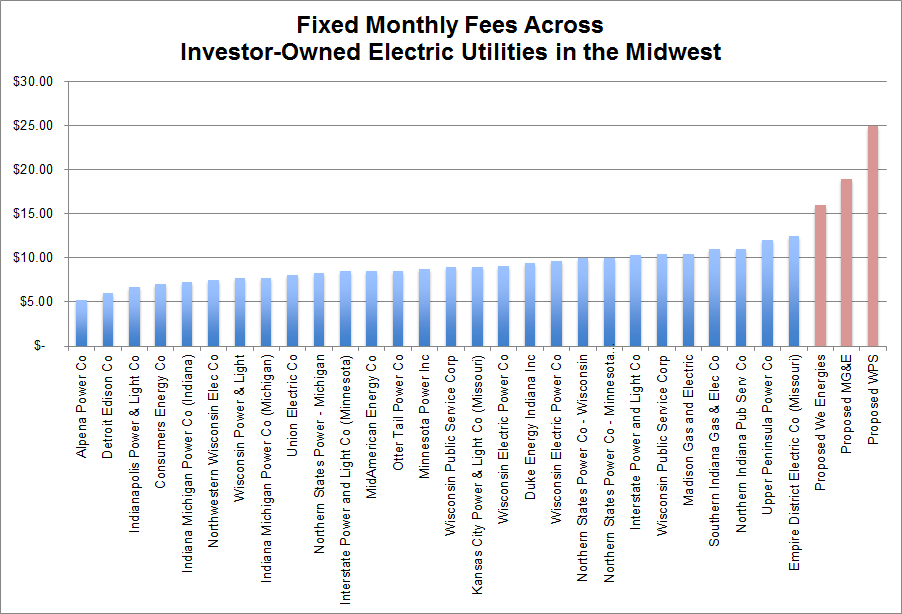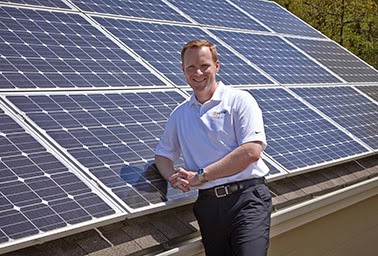
by jboullion | Aug 14, 2014 | Uncategorized
This article was published electronically August 14, 2014 in the Energy & Environment News Service and is re-printed here with permission from the reporter.
Evan Lehmann, E&E reporter
Four years ago, a Wisconsin Republican urged his party to overcome its fear of environmental action, saying that a conservative green movement could strengthen both the economy and GOP candidates. Then he got clobbered.
Now his son is taking a turn. Matt Neumann hopes to convince state officials that Wisconsin needs a big expansion of solar power. Among his audience are members of the Republican Party including friends of his father, former U.S. Rep. Mark Neumann, who was later defeated in back-to-back primaries, first for governor in 2010 and then for the Senate two years later.
The younger Neumann resembles his dad, a former math teacher, both in looks and in his conspicuous conservatism. They both promote the environment, and they hope to make money conserving it. They do have one big difference: “Politics drives me nuts,” Matt Neumann said.
Instead of running for public office, he’s making his energy pitch as president of the Wisconsin Solar Energy Industries Association and as the co-owner of a solar installation business that he runs with his father.
Matt Neumann, president of the Wisconsin Solar Energy Industries Association. Photo courtesy of the Wisconsin Solar Energy Industries Association
He enters public policy at a turbulent time. Wisconsin has seen its installation of solar systems drop since 2010, following eight years of modest growth. The state now has about 17 megawatts of installed solar power, enough to provide electricity to about 2,600 homes, according to Neumann’s group. That amounts to about 0.1 percent of the state’s renewable energy. In other words, it’s barely perceptible. [RENEW Wisconsin note: solar electricity accounts for less than 0.03% of Wisconsin’s electricity.]
The key reason behind Wisconsin’s sluggish growth is opposition by its utility sector, according to advocates of renewable energy. Utilities like We Energies, Wisconsin Public Service Corp. and Madison Gas and Electric Co. are pre-positioning themselves to avoid potential future losses from homegrown power, like solar arrays, by seeking fixed rates rather than charging customers for the amount of energy they use.
That can discourage conservation, clean energy advocates say, and it might dampen the economic impetus for installing solar on your rooftop: If a customer can’t lower his or her power bills by using solar electricity, then the investment doesn’t make sense, advocates say.
Neumann uses conservative touchstones to describe the state of things. For him, it’s a lack of “liberty” that prevents a property owner from choosing how to power his or her home or business. He said this absence of “energy choice” contradicts Republican tenets, which run strong in a state where the governor, Scott Walker, is favored by the tea party.
“We’re very conservative here in Wisconsin,” Neumann said. “The reality is free market capitalism, the choice to choose how you buy your energy, and how you finance that acquisition, the ability to lower your long-term energy costs — those are all very conservative principles and yet for some reason we’re struggling to adapt.”
Protecting customers, or profits?
Rate proposals currently being considered by the Wisconsin Public Service Commission would increase fixed monthly costs from $9 to $16 for customers of We Energies, the state’s biggest utility. Bigger jumps are being sought by Wisconsin Public Service Corp., which wants to double the fixed costs for residential customers to $25, and Madison Gas and Electric, which proposed a monthly fixed fee of $68 by 2017 before settling for $19 next year. That’s an 82 percent jump.
We Energies is also asking regulators to allow it to pay much less for electricity generated by homeowners, who can sell excess power derived from solar panels and other systems to utilities. The company is seeking to decrease the current price of 14 cents per kilowatt-hour to between 3 and 5 cents.
Cathy Schulze, a spokeswoman for We Energies, said the current price is above market rate, and the cost is passed on to other ratepayers. She also said the utility is moving to fixed prices to ensure that customers without solar aren’t required to shoulder more of the costs of maintaining the grid’s infrastructure — like poles, wires and utility employees.
“The costs are shifting to those people who don’t have their own generation right now,” Schulze said. “It may not be as big of a problem right now, but as that [solar] industry continues to grow, you’re going to see that disparity and that cost grow wider.”
Others see it differently. Tyler Huebner, executive director of RENEW Wisconsin, which advocates for cleaner power, said that the utilities are trying to cover recent investments in coal and gas plants with higher fixed fees. Customers shouldn’t be tied to the cost of those plants, he said, if they find cheaper, cleaner power alternatives.
If the buyback rate for excess solar power drops from 14 cents to 4 cents, it would price solar systems out of the marketplace, he said. “That’s the concern,” Huebner said.
Neumann said solar could thrive in Wisconsin if lawmakers would clarify that third-party ownership of solar systems is allowed. His company is an example. SunVest Solar Inc. installs its own photovoltaic systems on homes, businesses and churches, and then sells the power to the property owner at a fixed rate over 20 years.
The rate is usually equivalent to the cost of conventional electricity, or lower, Neumann said, and it can expand the use of solar power because property owners don’t have to buy the equipment, which can cost up to $15,000 installed for a home.
On climate change: ‘I don’t know’
He’s hopeful that Wisconsin lawmakers will pass legislation allowing third-party financing. But he said the “big thing” that Republicans will have to overcome is the utilities’ argument that solar could increase the cost of electricity on those customers who don’t have it.
“It’s just plain not true,” Neumann said, noting that solar power cuts cost on utilities and customers by generating power at peak demand periods.
But the utilities seem to have the ear of lawmakers. State Sen. Robert Cowles, a Republican and chairman of the Energy, Consumer Protection and Government Reform Committee, said the idea that solar could shift the cost burden to other people is “pretty compelling.”
“I can tell you, the utilities are vehemently against this,” Cowles said of third-party ownership. “I’m not sure how we would get them to ever accept that. We would have to overwhelm them somehow. I mean, I’m not taking a position on this right now.”
Neumann, like his dad, is a conspicuous member of the Republican Party. As he emphasizes renewable energy, his party avoids it. The state GOP’s platform, adopted this year, doesn’t prioritize cleaner energy, or even mention it. Instead, the document promotes eliminating the Department of Energy and encourages environmental stewardship based on technology rather than “unnecessary government regulation.”
Neumann’s father, favored by some tea party groups during the primary for governor in 2010, pushed his party to expand its reach with young voters and others “put out from the Republican Party,” by mixing environmentalism into the GOP’s economic messaging. Among the ideas that Mark Neumann introduced in 2010 was a job-friendly plan to reduce carbon emissions.
“When I talk about the environment, that’s an issue people have been afraid to talk about on our side of the aisle,” he said at the time, seated beside future Gov. Scott Walker, a conservative Republican.
Neumann lost badly in the primary several months later as Walker sailed away with a 20-point victory.
For his part, Matt Neumann may stray from his party’s bosom, but he doesn’t abandon it. He looks at environmentalism through a lens of commerce. Pursuing it can enhance economic activity and provide jobs, he seems to say, but it’s unclear if environmentalism is an exclusive priority for him without the fiscal hangers-on.
He also treads carefully when asked about climate change. He declined to say if it’s occurring, something that might perhaps give him credibility when talking to conservatives about renewable energy.
“I don’t know on climate change,” Matt Neumann said. “I have no idea. I would have to study it a lot more — and probably should, given the industry we’re in.”
“I’m being totally honest with you — I just plain don’t know.”
Want to read more stories like this?
Click here to start a free trial to E&E — the best way to track policy and markets.
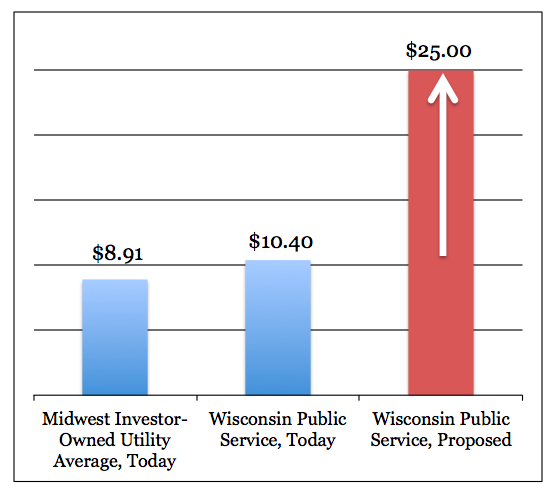
by jboullion | Aug 13, 2014 | Uncategorized
New billing scheme would punish customer
investments in efficiency, solar energy
In testimony pre-filed
today with the Public Service Commission, a former utility regulator and
utility executive criticized Wisconsin Public Service Corporation’s proposed restructuring
of electric rates and service charges.
The expert witness, Karl Rábago, will testify on behalf of RENEW Wisconsin and
the Environmental Law & Policy Center in September. Mr. Rábago stated
“the Company proposals reduce the value of energy savings and create a new,
unavoidable charge that punishes most those customers who have made the
greatest investments in clean and renewable energy options.”
Targeting residential and
small commercial customers, WPS seeks to sharply increase their base service
charges and lower their variable energy rates. For residential customers, the fixed
monthly fee would rise from $10.40 to $25. For small commercial customers, the fixed
monthly fee would climb from $12.50 to $35.
The energy rate would decline between 10% and 13%.
“This is effectively a ‘Robin Hood
in Reverse’ pricing model,” said Tyler Huebner, executive director of RENEW
Wisconsin, citing a term used by energy consultant Bill Marcus of JBS Energy. “It
would unfairly raise bills for customers who use relatively little electricity
over a year, including apartment dwellers, people on fixed incomes, and
seasonal businesses.”
If approved, the fixed fee
hikes sought by WPS would be the highest allowed for a regulated electric
utility in the Midwest. “The increase is so steep as to be literally off the
charts,” said Huebner.
Monthly fixed fees for residential customers of Wisconsin Public Service Corporation, as of today and proposed for 2015, compared to similar Midwestern utilities.
|
“This new billing scheme
would exact a financial penalty on customers who invested their savings in
clean energy systems that yield benefits to all WPS customers. A lower energy
rate creates a longer payback period for solar. It would dramatically lower
interest in solar self-generation by residential and small commercial customers
in 2015 and beyond. It could very well slam the door on solar for WPS’s customers,”
concluded Huebner.
The restructuring proposal
surfaced this spring as part of the Green Bay utility’s request for an overall 8%
increase in electric revenues over the next two years. The rate proposal is
under review by the Public Service Commission. We Energies and Madison Gas & Electric
have proposed similar changes, which would put their fixed monthly fees at 80%
and 113% above the Midwest average of $8.91, while WPS’ proposal would put it
181% above that average (see below).
The testimony of Karl Rábago and RENEW Wisconsin can be found here by
searching for docket number 6690-UR-123.
Graphic courtesy of the Environmental Law & Policy
Center. Data for both graphics comes
from OpenEI.org, an open-source data-sharing platform supported by the National
Renewable Energy Laboratory, and the U.S. Energy Information Administration at eia.gov. The
dataset included monthly fixed charges besides the “customer charge,”
such as a monthly distribution charge that is labeled separately on the bill,
to report the total monthly fixed rate.
-END-
RENEW
Wisconsin is an independent, nonprofit 501(c)(3) organization that leads and
accelerates the transformation to Wisconsin’s renewable energy future through
advocacy, education, and collaboration.
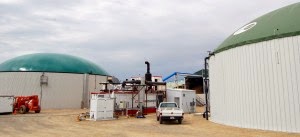
by jboullion | Aug 7, 2014 | Uncategorized
August 06, 2014 7:30 am • By Jessica VanEgeren| The Cap Times
Photo courtesy of the Capital Times article. Methane from manure digesters on the Crave Brothers Farm produce enough electricity to power 550 average homes.
Supporters of a surge in the construction of manure digesters and the non-fossil fuel bioenergy they produce say a proposed buyback rate cut by one of the state’s largest utilities would halt their growth.
Milwaukee-based We Energies has submitted a rate filing change to the state’s Public Service Commission that would drop the buyback rate for new customer-sited bioenergy products, like digesters that process manure and food waste, from 9.2 cents to 4.24 cents per kilowatt-hour.
The amount utilities pay for the methane gas is critical in the financial viability of the emerging use of the digesters in Wisconsin and nationally.
The surge in digesters began in 2001 when the state started its Focus on Energy program. It required utilities to obtain 10 percent of their energy from renewables — wind, solar, bio gas — by 2015. Consequently, manure digesters have been popping up across the state.
Wisconsin now has 34, the most in the nation, with two more scheduled to begin operating by 2015. In the digesters, bacteria eat biomass like manure, food scraps or whey and emit energy in the form of methane gas.
“No dairy farm or food processor can make the economics of generating electricity from bioenergy work at such a low rate,” said Tyler Huebner, executive director of ReNew Wisconsin. “This rate is guaranteed to stifle new bioenergy development in We Energies’ territory.”
If approved by the PSC, the new rate would apply to new digester projects beginning Jan. 1, 2016. Most existing digesters have 10-year contracts with We Energies. The new rate will not impact those customers until the contracts end.
ReNew Wisconsin said there are five existing bioenergy digesters connected to We Energies: the Forest County Potawatomi Digester in Milwaukee, Green Valley Dairy in Shawano, Clover Hill in Campbellsport, Volm Farms in Addison and Crave Brothers in Waterloo.
Cathy Schulze, a We Energies spokeswoman, confirmed We Energies has five customers under its current buyback rate but would not confirm the specific customers. She said each of the customers has a 15-year contract, with most expiring in a decade. “They were already aware this rate would not be continued,” Schulze said.
She said We Energies is cutting the rate because customers that generate some of their own power also use the grid in order to sell excess power that is not used on their own property. Since the power grid is paid for and used by all customers, “we contend that those other customers should only have to pay a comparable market rate for that power.”
For example, the two digesters on the Crave Brothers’ farm produce enough methane gas to power the farm, a cheese factory and an additional 300 homes, said owner Charles Crave. The remaining energy is sold to We Energies by Clear Horizons, the owners of the digesters.
Crave said utilities are looking to make money in the renewable energy market, and We Energies is no exception.
We Energies owns the state’s two largest wind farms, Glacier Hills Wind Park and Blue Sky Green Field, Schulze said. She said the utility also has invested $1 billion in renewable energy, including the wind farms and a biomass plant in Rothschild.
“What the utility is doing is snookie. It’s sneaky and underhanded,” Crave said. “Why would they want to give others those green dollars when they can get the money themselves?”
Lawmakers had an opportunity to expand the program earlier this year but the Democratic-sponsored bill died in the Republican-controlled Legislature.
Consequently, some digester owners are flaring off, or burning, the methane gas emitted from digesters because it cannot be processed or sold.
Others are searching out partners to make deals. Take La Crosse-based Gundersen Health Systems. It owns two digesters in Dane County, the final two of 10 renewable energy projects that are part of the company’s lofty 2008 plan to move off the power grid and achieve energy independence in six years, or by the end of this year.
When the two digesters in Dane County reach full production capacity later this year, Gundersen will hit the mark.
For the next five years, Madison Gas and Electric is buying back 1.5 megawatts of power from Gundersen’s community digester in Springfield for more than 11 cents a kilowatt hour. Through a separate contract with Gundersen for the Springfield digester, MGE is buying back the remaining half megawatt at 6 cents a kilowatt hour.
Dane County essentially traded some of its renewable energy credit with MGE to make the project financially viable for Gundersen.
“That agreement made the math work for Gundersen,” said Dane County Executive Joe Parisi in a July Cap Times article. “That deal needed to be made to make the digester happen.”
Murray Sim is executive vice president of Clean Energy of North America, an energy consulting and project development company for large biogas and natural gas projects.
He said third-party investors are looking to spend “billions on renewable projects” across the country and the uncertainty in Wisconsin is putting the state at a competitive disadvantage.
“What you have in Wisconsin is a story that started before We Energies. What you have is uncertainty created by the Public Service Commission,” Sim said. “The PSC has not come out strongly to say that third-party owned generation is OK. Wisconsin is missing out on a significant industry trend and customers are paying more for energy because of it.”
Read the article at the Capital Times.
by jboullion | Aug 5, 2014 | Uncategorized
Utility Proposes Anemic Buyback Rate for New Customer-Sited Bioenergy
Press release issued by RENEW Wisconsin, 8/5/2014
Contained in Milwaukee-based We Energies’ pending rate filing is a proposal to cut the buyback rate for new customer-sited bioenergy projects by more than half, down to 4.24 cents per kilowatt-hour (kWh) beginning in January 2016. The proposed rate would also apply to existing biodigesters once their existing power purchase contracts with We Energies expire.
Currently, We Energies pays about 9.2 cents per kWh for electricity generated from biogas produced from dairy cow manure or food wastes, and that rate remains in effect for the first 10 years of that system’s operation. We Energies’ biogas rate, along with similar rates offered by other utilities, was instrumental in building up bioenergy’s strong presence in Wisconsin. However, We Energies discontinued its special biogas offer several years ago, as have other utilities.
“Biogas generation provides tremendous benefits to Wisconsin,” said Tyler Huebner, RENEW Wisconsin’s Executive Director. “Biogas provides another revenue stream to dairy operations to offset fluctuations in milk prices. It helps Wisconsin keep energy dollars in the state, because we send $16 billion a year out of Wisconsin to pay for energy when we can make more of it here at home. It helps clean up our environment by reducing phosphorous at the source. The list goes on and on.”
According to RENEW Wisconsin, a renewable energy organization intervening in We Energies’ rate case, the 4.24 cents/kWh rate is a key part of We Energies’ ambitious plan to undermine the economics of customer-sited renewable energy systems through a combination of low power purchase prices and onerous charges. The Public Service Commission will review the utility’s proposal and make a decision on it before the end of this year.
“No dairy farm or food processor can make the economics of generating electricity from bioenergy work with such a low rate,” said RENEW Wisconsin executive director Tyler Huebner. “This rate is guaranteed to stifle new bioenergy development in We Energies’ territory.”
“Moreover, dairy operations with existing generating units may have no choice but to discontinue producing electricity when their current contracts with We Energies expire,” Huebner said. “The gas will either be put to a less financially attractive use or simply flared off.”
“There is no compelling rationale for a buyback rate this low,” Huebner said. “Several of We Energies’ power plants, such as Valley and Rothschild, have fuel costs that exceed 4.24 cents/kWh.”
Fuel costs at Rothschild, a new biomass cogeneration plant in central Wisconsin, are averaging over 10 cents/kWh in 2014.
“Even under the 9.2 cents/kWh rate, buying electricity from operations such as Crave Brothers near Waterloo and Clover Hill near Campbellsport is less expensive than generating electricity from that plant,” Huebner said.
“We’re worried that with We Energies’ proposed acquisition of Wisconsin Public Service (WPS), this low-ball rate, if approved, will spread into prime Wisconsin dairying country in 2017. If WPS follows We Energies’ lead, this could put on-farm bioenergy development in a state of permanent contraction.”
Existing bioenergy generation systems interconnected to We Energies include Forest County Potawatomi Digester (Milwaukee, 2,000 kilowatts); Green Valley Dairy (Shawano, 1,200 kW), Crave Bros., (Waterloo, 633 kW); Clover Hill (Cambellsport, 480 kilowatts); and Volm Farms (Addison, 225 kW).
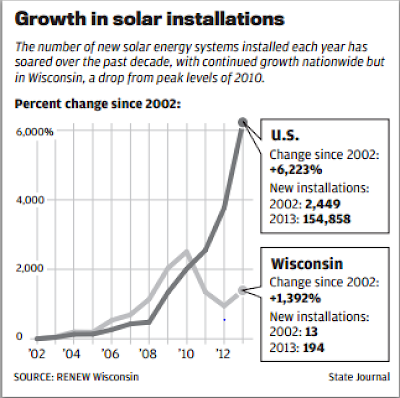
by jboullion | Jul 28, 2014 | Uncategorized
Read the Wisconsin State Journal report on MG&E’s efforts to restructure electricity rates, which, if approved, would discourage energy efficiency and solar generation on customer rooftops. However, MG&E’s rate filing fails to quantify the alleged revenue loss attributable to energy efficiency and on-site renewables.
The Wisconsin State Journal also wrote about how We Energies also faces opposition for its proposed rates. According to RENEW Executive Director Tyler Huebner, this proposal is “as drastic as any proposal nationally.”
We Energies has dropped its protest over groups participating in its rate case, something Tyler Huebner says “can [give] the best possible look at not just the costs but also the many benefits of local renewable energy.”
The rate filings presented by these utilities are “ultimately…about fairness,” according to Bill Skewes of the Wisconsin Utility Association. Matt Neumann, owner of Pewaukee-based SunVest Solar, agrees, stating “it should be the customer’s choice. It’s their property. It’s their rooftop….people should have the choice of how they want to finance things on their own property.”
Does Wisconsin really have a fair renewable energy policy? Decide for yourself.

by jboullion | Jul 25, 2014 | Uncategorized
Stevens Point City-Times ran an article this past Wednesday that articulates the current obstacles distributed solar power generation faces in Wisconsin, particularly from the major utility companies in the state.
MREA Column: Will Wisconsin Utilities Be Left in the Dark?
July 23rd, 2014
Solar power is a shining American success story. In 1954 the modern solar cell was developed by Bell Labs, and over the past 60 years as solar installations have grown, the prices have dropped dramatically – making solar affordable for more Americans. In fact, a solar electric system is installed an average of every 4 minutes in the U.S. today. Solar is popular close to home as well. According to a recent survey by UW- Milwaukee, 68% of Wisconsin residents support using more renewable energy. Solar and renewable energy (while currently a small percentage of our energy generation mix) continue to grow in deployment and have an incredibly bright future.
One group who does not share in the excitement for solar is Wisconsin’s electrical utilities. Many of our modern conveniences run on electricity, and utility companies in Wisconsin have maintained a steady, reliable electrical grid that keeps the lights on and our gadgets charged. Wisconsin currently has a regulated and monopolized utility market, and most residents are served by utilities that are investor-owned. This means the utilities need to generate revenue to keep shareholders happy; the more electricity they produce and deliver, the greater their profit. Other Wisconsin residents are served by either cooperatives (led by a member-elected board), or by municipal utilities that are run by local governments.
Read the rest of the article
here…



